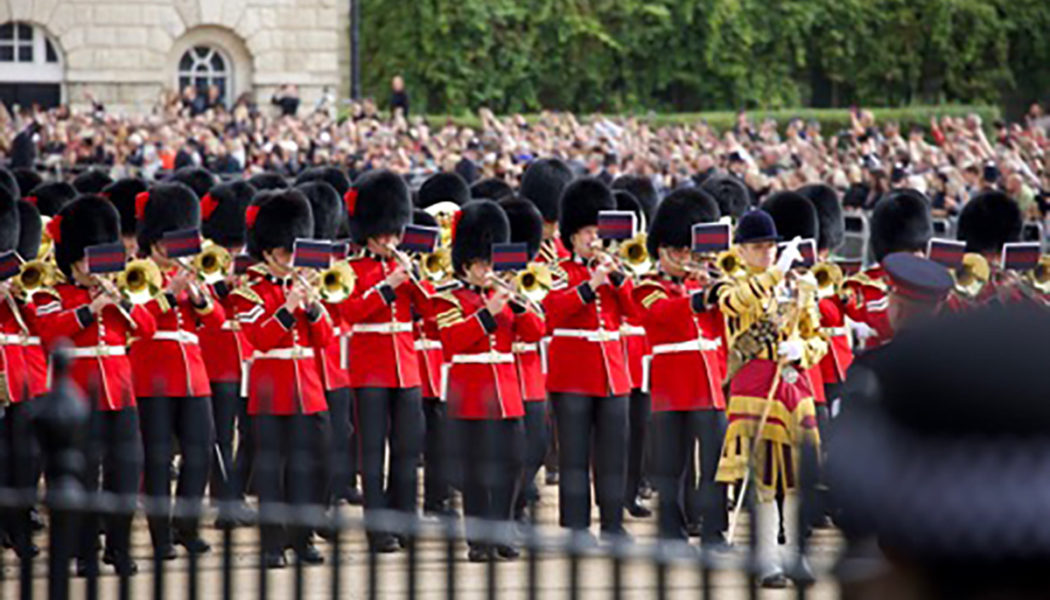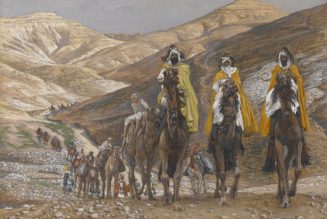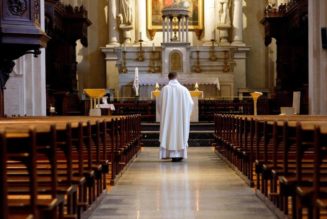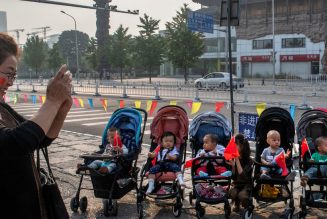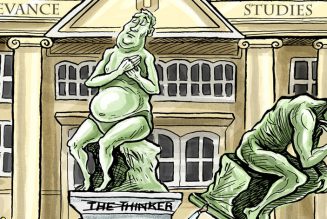LONDON — The world gave a final fond farewell to Queen Elizabeth II on Monday as she was laid to rest at Windsor Castle following an historic Anglican state funeral at Westminster Abbey attended by hundreds of global leaders and watched by millions worldwide.
The simple yet traditional ceremony — as the Queen herself had wished — was rich in scriptural references that had guided her reign, as well as passages dwelling on the Lord’s resurrection from the Anglican Book of Common Prayer.
The Anglican dean of Westminster, the Very Rev. David Hoyle, led the service and in his bidding prayer remembered the Queen’s “lifelong sense of duty and dedication to her people.” With thanksgiving, he added, “we praise God for her constant example of Christian faith and devotion,” and he recalled “with affection” her “love for her family and her commitment to the causes she held dear.”
In a brief sermon to the 2,000 mourners who included U.S. President Joe Biden and the first lady, the Anglican archbishop of Canterbury, the Most Rev. Justin Welby, focused on the Queen’s deep sense of service, saying it had its “foundation in her following Christ — God himself — who said that he ‘came not to be served but to serve and to give his life as a ransom for many.’”

“People of loving service are rare in any walk of life; leaders of loving service are still rarer,” Archbishop Welby continued. “But in all cases those who serve will be loved and remembered when those who cling to power and privileges are long forgotten.”
The Catholic Church was well represented at the service, along with other religions. Cardinal Vincent Nichols of Westminster read the fifth of seven prayers, giving thanks for the Queen’s commitment to the Commonwealth and praying that the political association of 56 member states would strive for the common good and the “establishment of righteousness and peace.”
Also in attendance were the United Kingdom’s three other leading Catholic prelates: Archbishop Leo Cushley of St. Andrews and Edinburgh, Archbishop Mark O’Toole of Cardiff, and Archbishop Eamon Martin, primate of all Ireland. Liverpool-born Archbishop Paul Gallagher, the Vatican’s “foreign minister,” represented Pope Francis and the Holy See.
The stirring music at the funeral, carefully chosen by Her Majesty, included well known and poignant Anglican hymns such as The Day Thou Gavest, Lord, Is Ended, The Lord’s My Shepherd, I’ll Not Want, which was sung at the Queen’s wedding in 1947, and Love Divine, All Loves Excelling.
Sir James MacMillan
The acclaimed Scottish Catholic composer Sir James MacMillan composed one of two new anthems at the funeral. Titled Who Shall Separate Us? from Chapter 8 of St. Paul’s Letter to the Romans, the piece was performed by the Westminster Abbey Choir after Archbishop Welby delivered the Commendation.
In comments to the Register, MacMillan said he was told that that Scripture passage was important to the Queen, “as it gets right to the heart of her relationship with Jesus.”
“Her Christian faith was an inspiration to millions, perhaps billions, around the world, and her ability to communicate it with devotion and pastoral insight in her Christmas messages and on other occasions was the central focus of significance in her life and example,” said MacMillan, who had composed the piece some time ago in anticipation of the Queen’s eventual death.

He added that he had “rarely reflected so deeply on a text, both while I was setting it and in the years since,” and said he was “moved to have been invited to write this anthem for this event and to set this particular text, which was so dear to the Queen’s heart.”
MacMillan’s score, said Charles Cole, director of the famous London Oratory Schola, was a “personal musical highlight” of the funeral, adding it was an “especially powerful work, with brilliant word-setting, and culminating in a magnificent Alleluia, which was perfectly judged for this moment at the pinnacle of the funeral liturgy.”

Performed as the pallbearers turned before the final procession, Cole noted the powerful symbolism of the Crown atop the Queen’s coffin, with its central cross, turning “slowly on the spot: Stat crux dum volvitur orbis (‘Steadfast is the cross as the world turns’)” — a reference to the fact that it marked the end of a reign that had been a rock of stability for so many lives, for so many years.
Archbishop Gallagher told the Register after the ceremony he was “moved and greatly impressed by the magnificent ceremonial, the devotion and love shown by everybody towards the Queen, and the unprecedented gathering of world leaders to pay their respects.” The faith of Her Majesty “was a constant theme and renewed my hope in the relevance of religion and Christianity in particular in our lives,” he said.
After a final blessing and a rendition of the national anthem, Her Majesty’s coffin was processed out of the abbey and then carried on a Royal Navy gun carriage through central London, led by the Royal Canadian Mounted Police, representatives of the Police Service of Northern Ireland and the National Health Service, along with detachments from the Armed Forces of the Commonwealth — 4,000 military personnel in total.
Two hundred musicians, made up of the pipes and drums of Scottish and Irish regiments, the Brigade of Gurkhas and the Royal Air Force, provided the solemn music as the Queen’s coffin made its way to Wellington Arch, where a hearse took it to Windsor Castle for the burial.
During the intimate committal service, the congregation heard how the Queen’s “calm and dignified presence” gave a rapidly changing and frequently troubled world “confidence to face the future” and did so “with courage and hope.” An emotional King Charles III wiped his eyes as a rousing rendition of the national anthem filled St. George’s Chapel and the Queen’s coffin was lowered into the Royal Vault beneath the chapel, joining her father, King George VI, and her husband, the Duke of Edinburgh.

Paid Respects

More than 750,000 people queued to pay their respects to the Queen, many waiting eight or more hours to visit her coffin that lay in state in Westminster Hall for four days. “She has been our loyal leader for 70-plus years, and I think it’s only right and fitting we should recognize that,” said Vincent from London, who had queued for nearly nine hours. “This is hardly a price to pay, really.”

On the day of her funeral, a million people came to London to pay their respects, filling St. James Park close to Westminster Abbey to capacity. Bill Miller, an Episcopalian from Houston, traveled to London specially to witness the funeral events. He said he had attended the funerals of former U.S. President George H.W. Bush and former first lady Barbara Bush, but told the Register the Queen’s funeral was “just astounding because those [of presidents] happen every four to eight years, but this is our whole life — I’m 70.”

Jake, a senior from Sarasota, Florida, praised the Queen for her solidity at a time of difficulty at home and abroad. “We’re distressed by things happening politically, but as believers, we know where our hope is,” he told the Register outside Westminster Cathedral. The Queen with her Christian values pointed “not only to what we need here” but also to the fact that “heaven’s our home,” and she did so “as a mother and as a queen,” he said.
Father Brian O’Mahony, sub-administrator at Westminster Cathedral, told the Register how the Queen’s death had led to a significant increase in worshippers who showed a “very strong sense of admiration” for the late sovereign. He especially observed that more generally in British society there is “a real feeling of suddenly it’s okay to talk about God in public life, and it’s okay to be Christian and to be proud to have Christian values.”

Father O’Mahony recalled how the Queen was the first monarch in 400 years to visit a Catholic place of worship when she visited the cathedral for a service in 1995, and he noted how during her reign anti-Catholic sentiment has decreased.

Others observed how, despite this media-driven secular age, the Queen’s passing has brought out so many supporters of both the monarchy and the Christian values she so clearly espoused. “The Queen’s funeral has shown the true sentiments of the silent majority of the British people — sentiments of selflessness, dedication and service to others — which have drowned out the vociferous voices of militant minorities,” said David, a retiree from Kent.
Many military veterans were among those in the crowd to pay their respects. One former soldier called Anthony, who since the age of 16 had served in the Parachute Regiment’s Second Battalion in Northern Ireland, Germany and made other tours of duty, said the Queen’s life and death meant a lot to him, given he had signed “the oath to fight for Queen and country.” He added that, for him, Elizabeth II’s death was like a close family bereavement.
“I lost my father last year, and I was quite surprised I had the same feelings come through,” Anthony said. He also pointed out that King Charles III, who trained as a “Para,” is colonel in chief of the regiment, having been appointed to the position in 1977.
Northern Ireland Legacy

Also present among those who had made the journey to pay their respects was Ed Petersen, coordinator of the Peace and Reconciliation Mission at Clonard Redemptorist Monastery in Belfast, which aims to build relationships between Catholics and Protestants, near to the location of a Peace Wall in the Northern Ireland city.
“Obviously, the Queen’s passing holds a different meaning for people, depending on where they live in Belfast,” Petersen told the Register, but added that Catholics were “definitely mourning as well, as they recognize the Queen made some very significant gestures of reconciliation when she visited us.” Her relationship with the Irish people “was quite strong, and so I do think there’s this tremendous respect for the Queen and sadness at her passing.”

He said her death comes at a time of new challenges for both the Catholic and Unionist communities and ahead of the 25th anniversary of the Good Friday peace agreement. However, he believes King Charles III “would have been well aware of the direction the Queen was taking regarding reconciliation, and I think he’ll want to continue that.”
Reflecting on his own personal affection for the late Queen, Sir James said she was a “central presence throughout my whole life and in the lives of countless others for many years.
“Her quiet devotion to this country, this people, this Commonwealth was the deciding factor for many people in their realization of just how unique and wonderful our constitutional monarchy is, in the way that it nurtures a true and profound democracy, perhaps the most successful and most efficient the world has ever seen.”
“We all feel sad, of course,” he said of the Queen’s death, “but I personally feel a deep, peaceful gratitude to Her Majesty for what she gave to us and the world throughout her life.”

Join Our Telegram Group : Salvation & Prosperity
